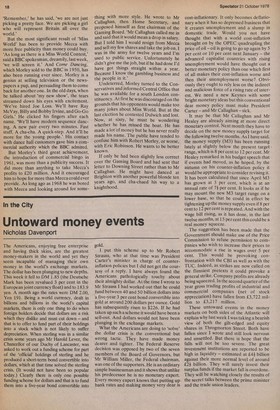In the City
Untoward money events
Nicholas Davenport
The Americans, enjoying free enterprise and having thick skins, are the greatest money-makers in the world and yet they seem incapable of managing their own money in the world's exchange markets. The dollar has been plunging to new depths. This week it fell to DM 1.85 (the Deutsche Mark has been revalued 3 per cent in the European joint currency float) and to 183.9 yen. A month ago the rates were DM 2.00, Yen 191. Being a world currency, dealt in billions and billions in the world's capital markets, there is only one thing to do when foreign holders decide that dollars are a risk which they dislike and must cut down — and that is to offer to fund part of their holdings into a stock which is not likely to suffer depreciation. When sterling was in a similar crisis some years ago Mr Harold Lever, the Chancellor of our Duchy of Lancaster, was asked to work out a funding scheme for part of the 'official' holdings of sterling and he produc&l a short-term bond convertible into dollars, which at that time solved the sterling crisis. (It would not have been so popular today.) Clearly there is only one possible funding scheme for dollars and that is to fund them into a five-year bond convertible into gold.
I put this scheme up to Mr Robert Strauss, who at that time was President Carter's minister in charge of counterinflation policies but I did not get the courtesy of a reply. I have always found the Americans pathologically touchy about their almighty dollar. At the time I wrote to Mr Strauss I had worked out that he could fund between 40 and 50 billion dollars into a five-year 3 per cent bond convertible into gold at around 200 dollars per ounce. Gold has subsequently risen to $226. If he had taken up such a scheme it would have been a sell-out. And dollars would not have been plunging in the exchange markets.
What the Americans are doing to 'solve' the dollar crisis is the conventional but wrong tactic. They have made money dearer and tighter. The Federal Reserve decision was opposed by two of the seven members of the Board of Governors, but Mr William Miller, the Federal chairman, was one of the supporters. He is an ordinary simple businessman and it shows that unlike his predecessor he is no monetary expert. Every money expert knows that putting up bank rates and making money very dear is cost-inflationary. It only becomes deflationary when it has so depressed business that it creates unemployment and a slump in domestic trade. Would you not have thought that with a world cost-inflation brought on by the OPEC quadrupling the price of oil —oil is going to go up again by 5 per cent or 10 per cent next January — the advanced capitalist countries with rising unemployment would have thought out a better monetary policy than one which first of all makes their cost-inflation worse and then their unemployment worse? Obviously they ought to rely less on the indirect and malicious force of a rising rate of interest. We need a new Keynes with some bright monetary ideas but this conventional dear money policy must make President Carter — and Mr Callaghan — sick.
It may be that Mr Callaghan and Mr Healey are already aiming at more direct monetary control. Next month they have to decide on the new money supply target for the following twelve months. As I have said, the money supply (M3) has been running lately at slightly below the present target range, which is 8 per cent to 12 per cent. Mr Healey remarked in his budget speech that if events had moved, as he hoped, by the autumn on his counter-inflation policy it would be appropriate to consider revising it. It has been calculated that since April M3 has grown at 3 per cent, which is at an annual rate of 7i per cent. It looks as if he may mount the new M3 target range on a lower base, so that he could in effect be tightening up the money supply even if 8 per cent to 12 per cent is repeated. And with the wage bill rising, as it has done, in the last twelve months, at 15 per cent this could be a real money squeeze.
The suggestion has been made that the Government should make use of the Price Commission to refuse permission to companies who wish to increase their prices to accommodate a rise in wages over 5 per cent. This would be provoking confrontation with the CBI as well as with the TUC. Indeed, as strikes are now called on the flimsiest pretexts it could provoke a general strike. Company profits are already being squeezed. In the second quarter of the year gross trading profits of industrial and commercial companies (net of stock appreciation) have fallen from £3,722 million to £3,217 million.
These untoward events in the money markets on both sides of the Atlantic will explain why last week I was taking a bearish view of both the gilt-edged and equity shares in Throgmorton Street. Both have fallen since I wrote and still look nervous and unsettled. But there is hope that the falls will not be too severe. The great investment institutions are reported to be high in liquidity — estimated at £4/ billion against their more normal level of around £2/ billion. They will surely invest their surplus funds if the market fall is overdone. They will be watching closely the results of the secret talks between the prime minister and the trade union leaders.






































 Previous page
Previous page